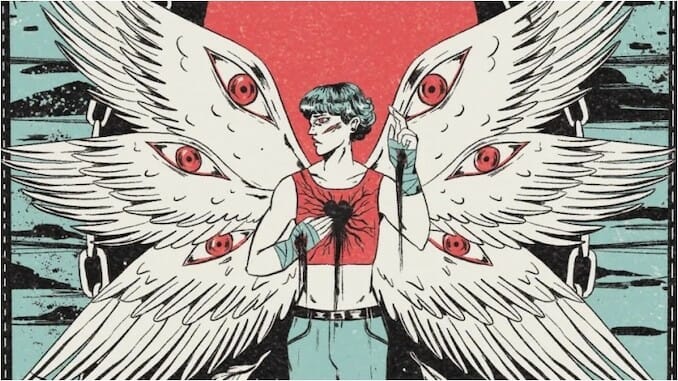Hell Followed with Us Is a Furious Post-Apocalyptic Tale of Queer Survival

Some of the most popular dystopian novels in recent years have actually been written in the YA genre space, whether they are stories of teens competitively killing each other for the amusement of rich elites (The Hunger Games), set in bleak faction-oriented societies that privilege certain groups over others (Divergent), or focused on a caste-based world in which young girls literally compete against each other to win the hand of a prince and the chance at a better life (The Selection). But even if you’ve read a lot in this particular subgenre—I promise you, nothing has prepared you for Andrew Joseph White’s Hell Followed With Us.
A pitch-black dystopian nightmare rippling with righteous fury, this is a story about the end of the world and the monsters who bring it about, and as a result, it contains everything from genocide and torture to murder and body horror. Full of explicit gore and violence, including shockingly detailed images of melting flesh, snapping bones, and various other mutilations and mutations, this is in no way a story for the faint of heart. And while there are wisps of occasional hope in White’s world, even the best of all possible outcomes are ones edged in (sometimes very literal) teeth and claws.
Yet, there is a complicated catharsis to be found in these pages, which are ultimately a story of both queer survival and queer perseverance, an unfortunately timely ode to those still fighting for the opportunity to be both seen and accepted for who they are. Hell Followed With Us is, truly, like nothing else you’ll read this summer, and its deft balance of destruction and rebirth offers a satisfying, if far from saccharine, end.
Set in a nebulous near-future time, Hell Followed With Us follows the story of Benji, a young trans boy who flees the cult that raised him. The Angels, an eco-fascist fundamentalist group that believes genocide is the only way to save both the planet and humanity, released a deadly virus known as the Flood as a plague to “cleanse” the earth. Billions die and more still are forever cursed, essentially melted and fused into the multi-faced nightmare creatures known as Graces, who seem to want nothing more than to die, but which the Angels continue to use to hunt survivors of their initial plague.
Benji was meant to serve as the cult’s final solution. Injected with a perfected version of the virus called Seraph, his body is slowly being changed and corrupted—White’s book is rife with descriptions of Benji coughing up various body parts and internal sludge—into what is essentially a living bioweapon. The process is unstoppable and irreversible, and part of the tragedy of this story is watching Benji slowly lose himself to the virus, just as he’s decided to finally lay claim to who he really is.
-

-

-

-

-

-

-

-

-

-

-

-

-

-

-

-

-

-

-

-

-

-

-

-

-

-

-

-

-

-

-

-

-

-

-

-

-

-

-

-








































